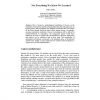Free Online Productivity Tools
i2Speak
i2Symbol
i2OCR
iTex2Img
iWeb2Print
iWeb2Shot
i2Type
iPdf2Split
iPdf2Merge
i2Bopomofo
i2Arabic
i2Style
i2Image
i2PDF
iLatex2Rtf
Sci2ools
125
click to vote
ALS
2003
Springer
2003
Springer
Not Everything We Know We Learned
This is foremost a methodological contribution. It focuses on the foundation of anticipation and the pertinent implications that anticipation has on learning (theory and experiments). By definition, anticipation does not exhaust all the forms through which the future affects human activity. Accordingly, guessing, expectation, prediction, forecast, and planning will be defined in counter-distinction to anticipation. The background against which these distinctions are made is explicit in the operational thesis advanced: Anticipation and reaction can be considered only in their unity. The interrelation of anticipation and reaction corresponds to the integrated nature of the physical and the living. Finally, an agent architecture for a hybrid control mechanism is suggested as a possible implementation. Context and Reference Einstein [1] observed that, “No problem can be solved from the same consciousness that created it. We must learn to see the world anew.” As my own work in anticipat...
ALS 2003 | Hybrid Control Mechanism | Machine Learning | Methodological Contribution | Pertinent Implications |
Related Content
| Added | 06 Jul 2010 |
| Updated | 06 Jul 2010 |
| Type | Conference |
| Year | 2003 |
| Where | ALS |
| Authors | Mihai Nadin |
Comments (0)

